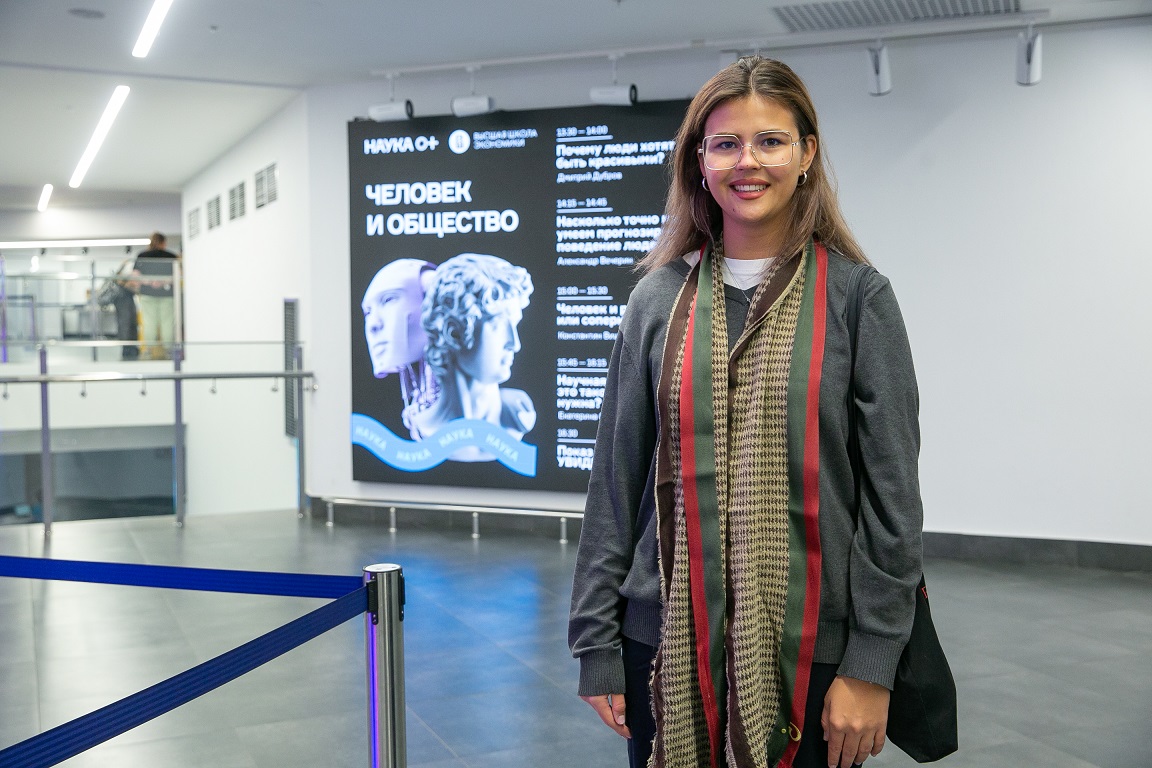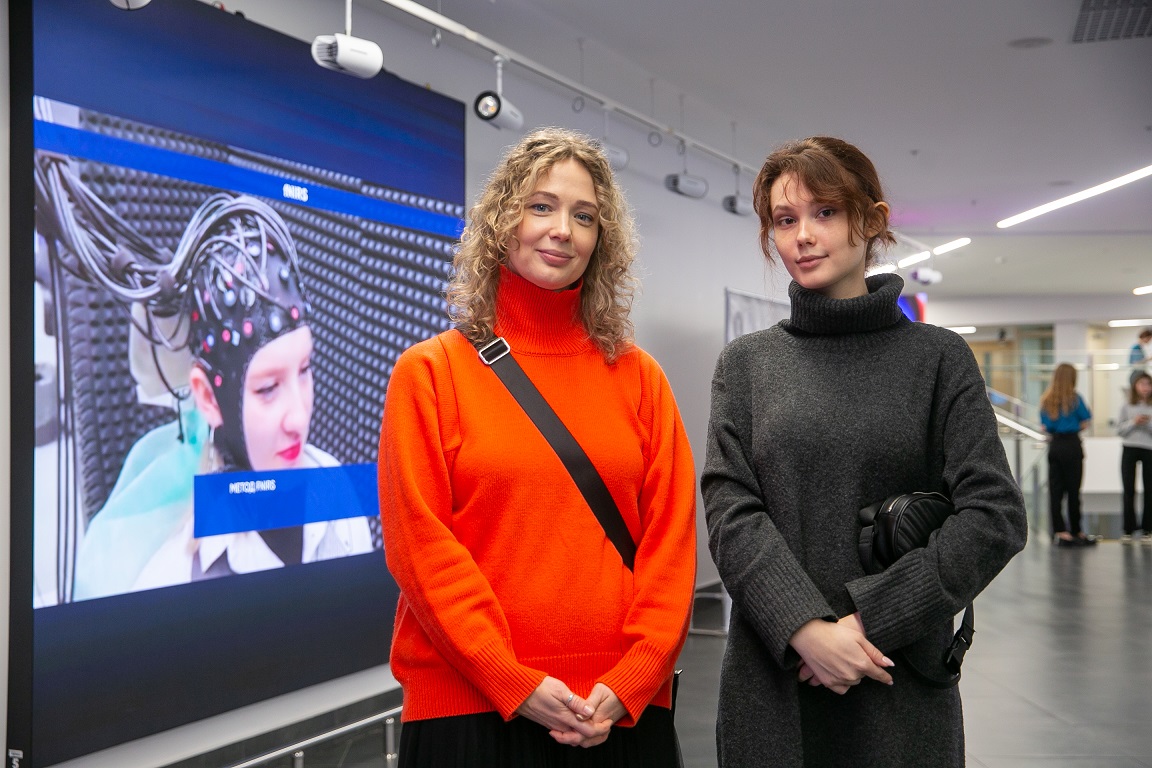‘People and Society’: HSE University Hosts NAUKA 0+ All-Russian Festival
On October 7, a ‘People and Society’ thematic platform opened at HSE University’s Cultural Centre as part of the NAUKA 0+ science festival. Guests were able to explore the world of scientific discoveries and interesting experiments, as well as listen to a series of lectures from leading HSE experts.
Every year, the NAUKA 0+ festival is held in numerous Russian cities at a variety of venues. Its main goal is to engage young people in the scientific agenda and establish a close connection between science and society. The festival brings together people who have been involved and interested in science for a long time and those who are just beginning to get acquainted with a particular field. Every year, over 850,000 people come to the event in Moscow—from preschoolers to senior citizens.
Guests of HSE University’s festival visited different stations where they listened to public lectures, participated in experiments using neurotechnologies, played intellectual games, and took part in a VR quest. The day ended with the screening of the film 2052: See the Future.

‘Empirical research on the topic of “People and Society” is the hallmark of our university,’ comments Andrey Kozhanov, Director of HSE University’s Centre for Student Academic Development. ‘It’s great that despite the bad weather, many spectators, families with children, and schoolchildren came to the lecture on Saturday. There were a lot of questions and a good atmosphere in the interactive area of the festival.’

Konstantin Vishnevsky, Head of Human Capital Multidisciplinary Research Centre scientific project of the National Centre for Medical Sciences, gave a lecture on people and robots. ‘This is a hot topic,’ he says. ‘It is important to understand how the relationship between robots and humans is built now and how it will be built in the future.’ According to the expert, many professions will soon be partially or completely under the control of robots. The topic of artificial intelligence was also touched upon by Alexander Vecherin, Associate Professor at the School of Psychology. In his lecture, he talked about how AI and neural networks help predict human behaviour. The programme was supplemented with lectures by Dmitrii Dubrov, Research Fellow at the Centre for Sociocultural Research, and Ekaterina Streltsova, Director of the Centre for Statistics and Monitoring of S&T and Innovation.
The festival's atmosphere is cozy and intimate, added Anastasia Zemlyakova, Head of HSE University’s Partnerships and Special Projects Unit. ‘We are showing what is perhaps a small selection of our achievements, but it is quite representative; we explain what HSE University is today, what kinds of interdisciplinary research we conduct, and what activities are implemented in order to improve both the educational and research environment,’ she explained.

Guests of the event shared their impressions with the HSE News Service. Darya Slavkova, a first-year master’s student at Moscow State Pedagogical University, is training to teach mathematics and computer science at universities. ‘I heard about the festival at a seminar at Moscow State Pedagogical University, I’m interested in it because there are topics on psychology,’ she says. ‘I’ve just passed a station that is related to the perception of smells, and I am also interested in the station with neural mechanisms. I also plan to listen to the lecture “How Accurately Can We Predict Behaviour?”. There are a lot of activities here today.’
Polina Infante, an 11th-grade student at Moscow School No. 171, is preparing to enrol in university. ‘I learned about today’s festival from my teachers. It is a great opportunity to spend an interesting weekend. I want to enrol in a course related to PR, perhaps at HSE University. I absolutely love it here,’ said Polina.

Her mother, Sofia Infante, was interested in the lectures at the NAUKA 0+ festival. ‘This is a very relevant topic,’ she says. ‘When choosing a profession, you should always carry out an analysis so that your specialty does not become irrelevant over time. Now, for example, many things are done by AI, and things that were previously long and expensive to create can be done in three seconds.’

Dalia Kambarova, a third-year student at the Faculty of Economics at the Kazakhstan branch of Moscow State University, came to the festival with a friend who had long wanted to visit HSE University. ‘I was interested in today’s lectures “Why Do People Want to Be Beautiful?” and “How Accurately Can We Predict People’s Behaviour?”. In addition, there are many interesting intellectual games and VR quests,’ explained Dalia.
See also:
HSE MIEM Students Demonstrate their Developments at Nauka 0+ Science Festival
Dance with a robot, become immersed in virtual reality, mount a weather station, learn about smart home technologies and just have a good time. At Nauka 0+ Science Festival, HSE showed that scientific development can be not only useful, but also accessible to everyone.
HSE to Participate in NAUKA 0+ Festival
This year’s NAUKA 0+ festival aims to turn science into something anyone can grasp. At the festival, various laboratories and universities open their doors to anyone and everyone with an interest in science and research. What will people learn about HSE at the festival? What new things will they see and discover? Let’s find out!
MIEM Students Demonstrate Google Glass Analogue and Portable Cardiograph at All-Russia Science Festival
Undergraduate and postgraduate students at the HSE Moscow Institute of Electronics and Mathematics (MIEM) recently presented their innovations at the All-Russia Science Festival (NAUKA+). Among them were ‘intelligent electric outlets’, which eliminate worries about irons being left plugged in, and a device for measuring eye fatigue.
HSE Takes Part in Nationwide Science Festival NAUKA 0+
It’s become fashionable to take an interest in science and research, and there are lots of researchers and academics at HSE who do in addition to carrying out research are gifted enough to be able to explain it in an engaging way to other people. You can meet them and learn about the latest research breakthroughs at the NAUKA 0+ festival, which gets underway in Moscow on October 9. Here’s an outline of what HSE offers as part of NAUKA 0+.
HSE is hosting the Science Cinema Festival ‘360°’
The third Science Cinema Festival ‘360°’ takes place in Moscow from 10-17 October. The HSE was one of the first to be involved in this festival and its screenings.
Getting Recognition for the Work that has been done
From May 25-26, 2013, the most recent in the series of regular meetings of the HSE International Advisory Committee took place at the HSE.


